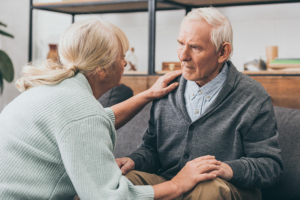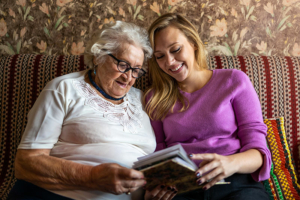Dementia and Conversation Looping: How to Break the Cycle

Dementia and conversation looping often go hand in hand, which can lead to frustration without knowing how to effectively respond.
If you have ever played music on vinyl records, you know that the needle does not always track properly. Occasionally, a small piece of debris or dust may cause it to get stuck or skip, leaving you hearing only a few words of the song over and over again until the problem is addressed.
In Alzheimer’s disease and other forms of dementia, memory blips can result in a similar effect described as conversation looping. Typically occurring in mild and moderate stages of the disease, dementia and conversation looping may look like this:
- You’re having an engaging conversation about your favorite football team’s latest victory.
- The individual with dementia suddenly changes gears and asks you if you’ve finished your homework.
- Knowing it is important to step into an alternate reality or timeframe with the person, you respond that all of your homework is finished.
- You then resume the conversation about the unbelievable touchdown that clinched the win.
- The other person asks again if you have finished your homework.
What Is the Appropriate Way to Handle Issues With Dementia and Conversation Looping?
It is beneficial to first understand why the behavior is occurring. We all experience repetition to varying degrees. We may forget that we have told someone a particular memory or story and tell them again. We also may repeat a question we have in mind, unsure whether we actually asked the question or simply just thought about it. These types of situations occur when we are not fully focused or paying close enough attention to the environment around us.
In contrast, conversation loops in dementia can happen as frequently as every couple of minutes. Professor of Psychology at Western Washington University Ira E. Hyman, Jr., Ph.D., explains that with cognitive impairment, “…the work of binding the elements of an experience into a personal memory is disrupted.”
It is important to recognize that correcting someone with Alzheimer’s is not a successful tactic. Understanding that, it’s advisable to continue to respond to the person’s repetitive question or story, keeping your reply brief. You can then try changing the topic to something you know is of particular interest to them now or was important to them during their younger years, as long-term memories stay intact considerably longer than more recent ones.
How a Specialized Alzheimer’s Caregiver Can Help
With many challenging behaviors and symptoms to manage, caring for a person with Alzheimer’s on your own can be daunting. Our caregivers are especially trained in effective approaches to managing the challenges experienced in dementia. Let us partner with you to ensure the highest quality care for someone you love.
Whether you are struggling with wandering, sundowning, hallucinations, aggression, or any other complications a family member is experiencing from Alzheimer’s, we can help. Contact us any time at (954) 486-6440 to learn more about our expert dementia care, available throughout Fort Lauderdale, Deerfield Beach, Plantation, and the surrounding areas.









 Everyone goes through good days and bad days, and everyone is entitled to negative thinking or irritability every now and then. If you are caring for an older adult who appears to have fallen into a routine of continual negativity and complaining, there could be a reason for it. It’s worthwhile to explore whether or not a health issue may be the culprit for negative mood changes in a senior.
Everyone goes through good days and bad days, and everyone is entitled to negative thinking or irritability every now and then. If you are caring for an older adult who appears to have fallen into a routine of continual negativity and complaining, there could be a reason for it. It’s worthwhile to explore whether or not a health issue may be the culprit for negative mood changes in a senior.
